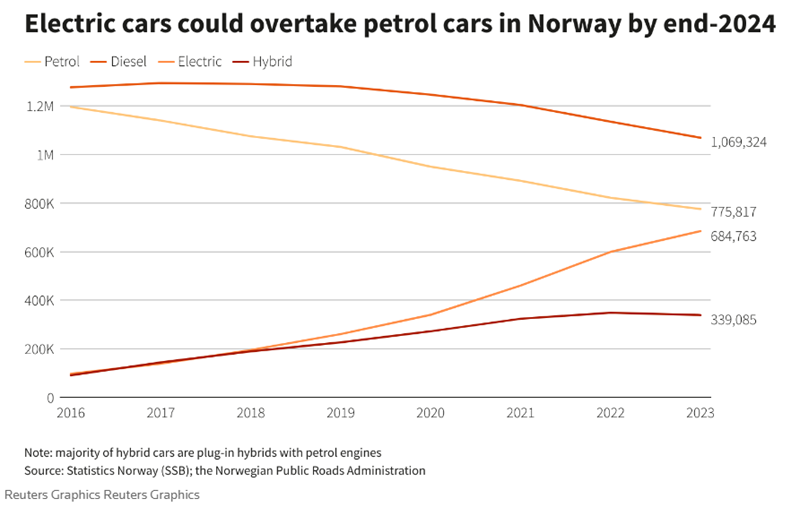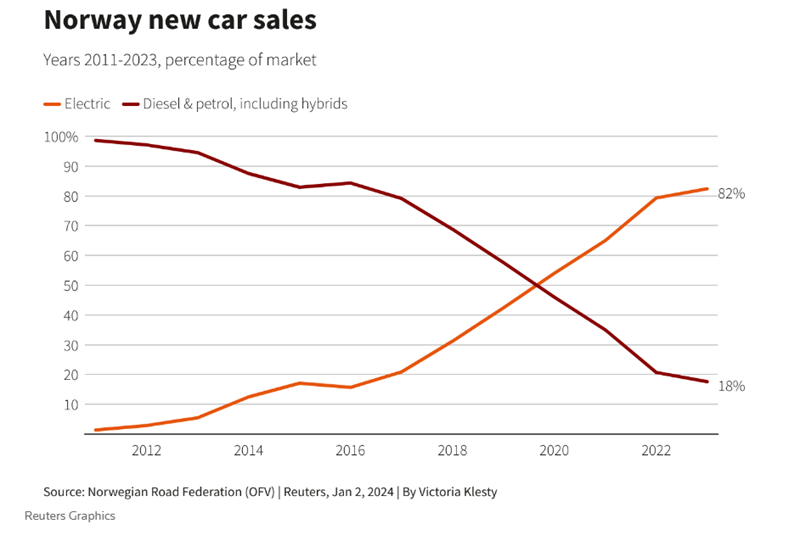
Norway set to lead as the world's first 'electric vehicle nation'
04/04/2024TN&MTIn a groundbreaking development poised to redefine the global automotive landscape, Norway is on the cusp of becoming the world's inaugural "electric vehicle nation." Drawing from a confluence of factors, including robust incentives and a steadfast commitment to sustainability, Norway's transformative journey towards electrification heralds a new era in transportation.

Electric cars are seen at Tesla charging station in Gulsvik, Norway (Photo: Reuters)
A recent analysis conducted by Reuters and industry experts reveals that the number of battery electric vehicles (BEVs) on Norway's roads is on track to surpass petrol cars by the end of this year or in early 2025—a landmark achievement unparalleled in any other nation. Bolstered by the nation's substantial oil and gas wealth, generous incentives have been instrumental in propelling this electric revolution.
Norway's ambitious goals underscore its status as a trailblazer in sustainable mobility. With a population of 5.5 million, the Nordic country aims to cease the sale of new petrol and diesel cars by 2025, setting an ambitious precedent for global emissions reduction efforts. Already, nine out of ten new cars sold in Norway at the onset of this year have been BEVs, signaling an unprecedented shift towards electric propulsion.

The ripple effects of Norway's electrification drive extend far beyond its borders. If more nations emulate Norway's lead, the demand for oil worldwide could peak earlier than anticipated, according to projections by the International Energy Agency. Despite the substantial costs incurred by Norway's transition, which includes tax exemptions for BEVs and investments in public charging infrastructure, the nation remains steadfast in its commitment to sustainability.
As of March 15, BEVs accounted for 24.3% of Norway's 2.9 million vehicles, inching closer to petrol vehicles at 26.9%. Projections suggest that BEVs could surpass the combined total of petrol and diesel cars in Norway by 2029, a testament to the nation's unwavering dedication to emissions reduction.
In the face of a recent slowdown in BEV sales, experts remain optimistic about Norway's electric future. Sales of new BEVs dipped last year amid rising interest rates and changes in tax incentives; however, BEVs still accounted for a record 92.1% of total sales in January. Despite challenges, industry insiders predict that BEV sales in Norway will exceed 76,000 this year, further cementing the nation's status as a global leader in electric mobility.

As Norway's transition to electric vehicles gains momentum, the decline in demand for petrol and diesel becomes increasingly evident. Sales of these fossil fuels have dwindled by approximately 8% at Norwegian gas stations since 2021, reflecting a paradigm shift in consumer preferences towards electric propulsion.
While hybrid vehicles have played a role in the transition, their market share has waned in recent years due to changes in government incentives. Plug-in hybrids, predominantly featuring petrol engines, account for 12% of Norway's total vehicle fleet.
The Norwegian Electric Vehicle Association anticipates that BEVs will constitute a staggering 95% of all new car sales this year, solidifying Norway's position as a global vanguard in sustainable transportation.
In essence, Norway's journey towards becoming the world's first "electric vehicle nation" stands as a testament to the transformative power of ambitious policies, steadfast commitment to sustainability, and a pioneering spirit in the face of global environmental challenges. As nations worldwide grapple with the imperative to decarbonize their transportation sectors, Norway's electrification drive offers a compelling blueprint for a greener, more sustainable future.
Ngoc Huyen (Reuters, Independent, Carscoop)
















